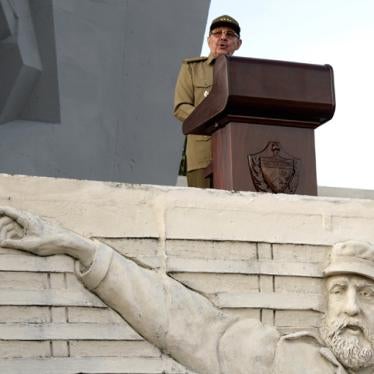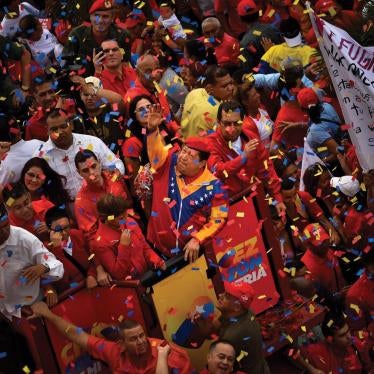(Washington, DC) - Raúl Castro's government has locked up scores of people for exercising their fundamental freedoms and allowed scores more political prisoners arrested during Fidel Castro's rule to languish in detention, Human Rights Watch says in a report released today. Rather than dismantle Cuba's repressive machinery, Raúl Castro has kept it firmly in place and fully active, the report says.
The 123-page report, "New Castro, Same Cuba," shows how the Raúl Castro government has relied in particular on the Criminal Code offense of "dangerousness," which allows authorities to imprison individuals before they have committed any crime, on the suspicion that they are likely to commit an offense in the future. This "dangerousness" provision is overtly political, defining as "dangerous" any behavior that contradicts Cuba's socialist norms.
"In his three years in power, Raúl Castro has been just as brutal as his brother," said José Miguel Vivanco, Americas director at Human Rights Watch. "Cubans who dare to criticize the government live in perpetual fear, knowing they could wind up in prison for merely expressing their views."
Based on a fact-finding mission to Cuba and more than 60 in-depth interviews, Human Rights Watch documented more than 40 cases in which the government has imprisoned individuals under the "dangerousness" provision for exercising their basic rights.
Ramón Velásquez Toranzo, who set out on a peaceful march across Cuba to call for respect for human rights and freedom for all political prisoners, was arrested and sentenced to three years in prison for "dangerousness" in January 2007.
Raymundo Perdigón Brito, a journalist who wrote articles documenting abuses by the government and published them on foreign websites, was sentenced to four years in prison for "dangerousness" in December 2006. He has endured repeated beatings by guards and solitary confinement during his incarceration.
The Raul Castro government also uses a range of other draconian laws to silence free speech, quash labor rights, and criminalize all forms of dissent. Human rights defenders, journalists, and other civil society members tried under these laws are subjected to systematic due process violations, including abusive interrogations, the denial of legal counsel, and sham trials.
Alexander Santos Hernandez, a political activist who was sentenced to four years for "dangerousness" in 2006, told Human Rights Watch, "[The police] picked me up at 5:50 a.m. while I was at home sleeping, and by 8:30 that morning they were already reading me my sentence." Santos was denied a lawyer, and the sentence he was given was dated two days before his trial took place.
Political prisoners are subjected to widespread abuses, including forced ideological re-education, extended solitary confinement, and the denial of medical treatment for serious illnesses.
In addition to imprisoning dissenters, Raúl Castro's government also enforces political conformity using beatings, short-term detention, public acts of repudiation, and the denial of work, among other tactics. Taken together, these everyday forms of repression create a climate of fear that has a profound chilling effect on the exercise of fundamental freedoms in Cuban society.
As a human rights defender, Rodolfo Bartelemí Coba, told Human Rights Watch in March 2009, "We live 24 hours a day ready to be detained." Ten days after making that statement, Bartelemí was arrested and taken to prison, where he remains.
Efforts by the US government to press for change by imposing a sweeping embargo have proven to be a costly and misguided failure, Human Rights Watch said. The embargo has inflicted severe hardship on the Cuban population as a whole, while doing nothing to improve the human rights situation in Cuba. Rather than isolating Cuba, the policy has isolated the United States, alienating Washington's potential allies on this issue.
"Despite new leadership in Havana and Washington, Cuba continues to crush dissent, while the US pursues the same failed embargo policy," said Vivanco. "As always, it is the Cuban people who are paying the price."
"New Castro, Same Cuba" recommends that the Obama administration secure commitments from the European Union, Canada, and Latin American allies to unite to press Cuba to meet a single, concrete demand: the immediate and unconditional release of all political prisoners within six months.
Those include the 53 prisoners who have been languishing in prison since a 2003 crackdown by Fidel Castro, as well as all scores of individuals incarcerated for "dangerousness" under Raul Castro.
Once this joint commitment is in place, the US government should end its failed embargo policy, Human Rights Watch said.
If the Raúl Castro government does not meet this demand, members of the multilateral coalition should impose targeted, punitive measures, such as travel bans on government officials or withholding new forms of foreign investment. These measures should be significant enough to bear real consequences for the Cuban government, while being careful not to impose suffering on the Cuban population as a whole, Human Rights Watch said.







